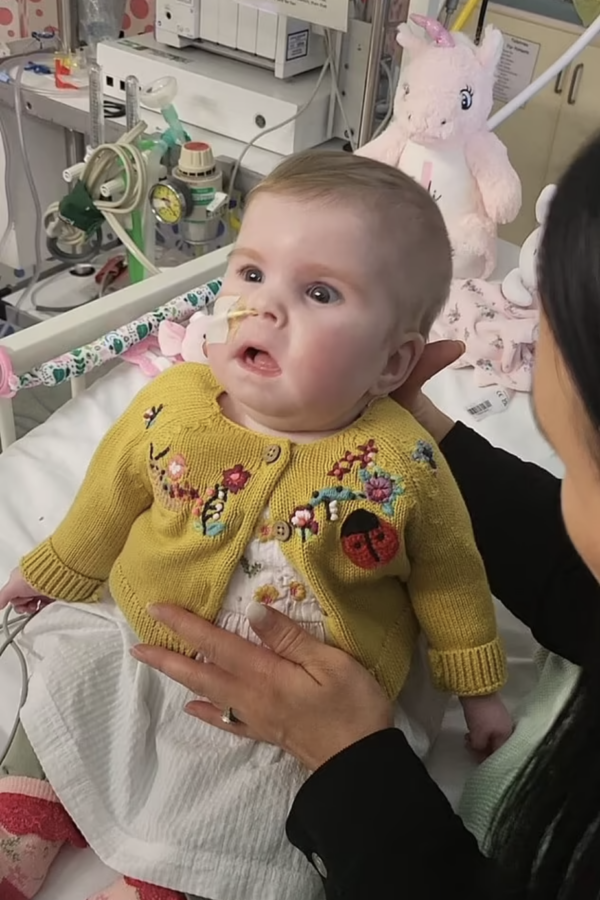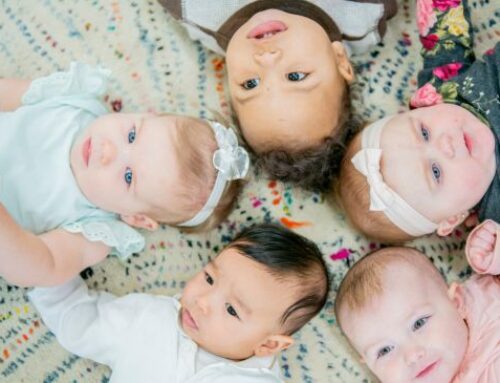Joanna Alphonso:
 The story of eight-month-old English baby, Indi Gregory, rocked the world for weeks as her life-saving treatment turned into end-of-life care against her parents’ wishes.
The story of eight-month-old English baby, Indi Gregory, rocked the world for weeks as her life-saving treatment turned into end-of-life care against her parents’ wishes.
Born with an incurable mitochondrial disease on Feb. 24, 2023, Indi spent her life fighting to remain alive. Her parents, Dean Gregory and Claire Staniforth, supported their baby girl in the hospital and eventually fought for her life in court.
Indi was on complete life support since Sept. 6, 2023. According to court records, she remained intubated, on ventilation and sedatives, in critical condition. She underwent numerous invasive treatments and interventions, including the use of IV lines, blood tests, and high flow oxygen therapy. Indi had heart defects, hydrocephaly (fluid buildup in the brain), seizures, blood oxygen desaturation, and other painful conditions.
According to The Guardian, the specialists caring for Indi at the Queen’s Medical Centre in Nottingham, U.K., claimed that she was dying, and that any treatment was futile, causing her more pain and suffering than any hope for a cure. Any life-saving treatment caused her great pain, evidenced by her winces, cries, and other signs of distress.
Indi’s parents claimed to have seen her improve. According to Christian Concern, an organization that provides legal support to Christians, there were several experts of diseases like Indie’s with the opinion that there was a possibility of non-invasive treatment to allow her to survive without intubation.
Court action begins
Indi’s treatment plan was agreed to be a “living document” according to the Nov. 10, U.K. Court of Appeal decision. This plan intended to remove life-saving treatment from Indi to allow her to die naturally and was approved by court order on Oct. 16,
Her parents refused to go along with this plan, against the hospital’s recommendations. Consequently, the National Health Services Trust of England (NHS) commenced legal action against Indi’s parents on behalf of the child. The NHS claimed that her parents were no longer acting in her best interests and were prolonging her pain and suffering by trying to keep her alive. In a series of trial and appeal hearings, the U.K. courts consistently ruled against Indi’s parents, and in favour of the NHS.
In an interview with Catholic News Agency (CAN), Anscombe Bioethics Centre director David Jones explained that there were three parties in the case: the NHS, Indi’s parents, and Indi as represented by an appointed guardian. “The court doesn’t have to wait until it’s shown that the parents are being harmful. They only have to show that there are two sets of people who are interested in the best interests of the child who cannot agree.”
The main issue in the court hearings was the “best interests” of Indi, centred on her suffering. The doctrine of the “best interests of the child” is a legal concept adopted worldwide in response to the 1924 Geneva Declaration and 1959 Declaration of the Rights of the Child. These conventions recognize the rights of all children and call on adults to protect their rights, especially because they may be unable to exercise them on their own. When reaching their decisions, the judges had to weigh the facts of Indi’s deteriorating condition against the wishes of the NHS, legally acting on Indi’s behalf, and her parents’ wishes.
In the Oct. 13 hearing, Indi’s parents cited not just U.K. case decisions upholding their cause, but also the UN Convention on the Rights of Persons with Disabilities, and the Rights of the Child. The judge found these arguments to be irrelevant. The Court found during this hearing, and in subsequent hearings, that there was no new medical evidence or opinion that swayed the judges to extend Indi’s treatment. The Court ordered her extubation and removal of other life-saving care.
Italian citizenship granted
A glimmer of hope appeared on Nov. 6 when Italian Prime Minister Giorgia Meloni and other Italian officials granted Indi emergency Italian citizenship in order to have her transferred to the Pope’s Bambino Gesù Hospital. In a Nov. 7 hearing, the judge denied the transfer request because he was not convinced of any substantive difference in the medical treatment which she would receive there compared to what she was already receiving.
This decision is baffling – the Prime Minister of another country offering free medical treatment in accordance with Indi’s parents’ wishes, at no burden to her current country … and this was also refused by the courts? The treatment outline sent from Bambino Gesù Hospital was made publicly available by Christian Concern. It said: “Indi’s treatment plan will include: 1. A right ventricular outflow tract stent to manage her cardiological condition; 2. Continuation of experimental treatments …; 3. Life-sustaining treatment and palliative care to ensure Indi’s survival and comfort while the treatments take effect.”
The Italian treatment plan was no different from what Indi was already receiving. Indi’s medical team claimed that a transfer would cause too much stress and suffering on the child. This is why the judge denied her transfer and ordered her extubation on Nov. 9, legally ruling in “her best interests.”
The final appeal
The final appeal hearing on Nov. 10, attempted to undo the decisions ordering removal of Indi’s care, claiming that the NHS worked underhandedly with the Courts to change her treatment plan without informed parental consent and on what the parents claim was information based on bad medical practice.
The Court rejected all claims as her treatment was initially agreed upon by her parents and the NHS to be a “living document,” and that Indi’s situation was more time-sensitive compared to the cases cited in the claim. The justices expressed their sympathy for the impossibly difficult situation that these parents faced.
The Court concluded that the parents had 25 days since the initial decision to arrange for some other treatment to benefit Indi, but there was no action aside from court hearings. The appeal was dismissed. Indi’s life support was removed at 2 p.m. local time on Nov. 9 and she died at 1:45 a.m. on Nov. 13.
The broad story
These situations raise numerous questions, particularly surrounding why the court had any interest in blocking treatment of Indi abroad.
According to the CNA, the Anscombe Bioethics Centre’s David Jones believes Indi’s case to be “symptomatic of a wider societal problem in the U.K. There’s a tendency in English culture to think that the state should just step in and solve the problem … which ends with disputes with institutions, with people dying in hospital instead of at home.”
American pro-life advocate Lila Rose tweeted, “This is murder, plain and simple. It’s a stain on the national conscience of the United Kingdom. There must be reckoning, there must be reform, and there must be reparations for the evil acts committed by both the medical teams and the UK courts.”
These events take us back to similar situations in 2017 and 2018, when Charlie Gard (2017) and Alfie Evans (2018) had life-threatening diseases, which ended amid legal battles between the medical system and loving parents of suffering children. In both cases, the children were offered transfers to the Pope’s hospital, which were both overruled by U.K. Courts. Alfie Evans, like Indi, was granted emergency Italian citizenship in hope that the transfer would be permitted.
Following the death of Charlie Gard, U.K. lawmakers attempted to address parental concern in such situations in an amendment to the Health and Care Act which requires parents to mediate with health authorities, and the authorities to take “all reasonable steps to ensure that the views of the parent, and of anyone else concerned with the welfare of the child, are listened to and taken into account.”
While this provision may allow for a greater participation of the parents of children in such situations, it seems that it has offered no realistic safeguards evidenced in the subsequent cases of Alfie and Indi. Jones told CNA that parents are “often blindsided by the need to suddenly prepare themselves for a court case.”
Ethics of palliative care
There is a difference between ordinary and extraordinary care. Treatment that provides relief from pain and other symptoms is classified as ordinary care according to most ethicists. Treatment that is painful, or financially or psychologically burdensome to the patient, and has a low likelihood of success, is deemed extraordinary. The Catholic Church and most Christian bioethicists do not hold that patients are required to undergo extraordinary measures to prolong life. That said, life is sacred and must be protected.
The legal and ethical questions in Indi’s and similar cases is the evaluation of suffering and the differing opinions between the NHS and the parents. The NHS witnessed suffering during the invasive treatments, but Indie’s parents witnessed smiles when she was conscious. Perhaps it was impossible to know the magnitude of the suffering of eight-month-old Indi. Perhaps the courts should have listened to the medical opinions that differed from those of the NHS. Perhaps Indi should have been given access to treatment in Italy if the U.K. system was no longer willing to treat her. Regardless, the National Health Service has a demonstrated track record of overruling the wishes of parents in ways that unquestionably shorten the lifespan of these young patients.




